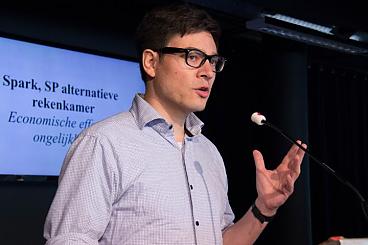Dijsselbloem’s chosen course is a danger to democracy
Dijsselbloem’s chosen course is a danger to democracy
The writer Milan Kundera drew a distinction between two types of provincialism. The provincialism of big countries consists of people paying little regard to what comes from abroad, their own affairs being enough; that of small countries, in contrast, proceeds precisely from an excessive esteem for the outside world, a world which is nevertheless seen as strange and out of reach. Hence the tendency of a small nation to closely embrace its important individuals, for these feed its pride and give the people something to cling to.

David Hollanders
Kundera was talking about writers, but it applies equally to politicians.
Dutch Finance Minister Jeroen Dijsselbloem’s re-election as Eurogroup president led to proud reactions in the national press. ‘Proud as a peacock’ read the headline in the national daily De Volkskrant. The reports on the appointment in the same paper spoke with barely contained enthusiasm about ‘Holland’s domination’ and accompanied this with a giant photo of a cool-looking Dijsselbloem towering above his fellow European politicians.
With Kundera in mind, feeling such enthusiasm can be imagined. A substantive reflection stands in the way, however.
The fact is that it was not Greece which was rescued in 2010, but private creditors, from Deutsche Bank to ING. The troika operated in this like the mechanism of a debt-collecting agency, taking over Greece’s debts and attempting to clear them. In doing so the state has available resources which banks don’t. The ultimate threat is that the ECB will pull the plug on Greece’s banks.
As everyone knows and even the IMF recognises, the debts can’t be repaid. Resultant losses won’t fall on the original creditors, however, but on the European public, playing Greek and non-Greek taxpayers one against the other.
The Dijsselbloem forms part of this configuration is in itself nothing to be proud of. If we look at the plans he has for the rest of Europe, yet more questions are raised. Dijsselbloem’s agenda for Europe is laid out in his candidacy statement for the Eurogroup presidency, a sort of personal election manifesto.
In this statement Dijsselbloem proposes further integration and centralisation of European economic policy, the key word for which is ‘competitiveness’. Part of this programme is the flexibilisation of the labour market, deregulation of the market in products and reform of pensions and social security. Dijsselbloem advocates a European framework of “national competitiveness councils”, planning departments run by Brussels which would be charged with guiding these reforms and telling national politicians what is and what isn’t permissible. This is a programme with a clear political colour, a programme which in a functioning democracy would be put before the electorate.
The fact that Dijsselbloem is going directly against everything for which his party – the PvdA (Labour Party)- claims to stand ought to have its members up in arms. This is, however, more than an internal party matter. Whether you’re on the left or right, this must surely call up some pretty big questions. What democratic mandate does Dijsselbloem have for his programme. He participates in the Eurogroup as a minister in a government elected on a promise to transfer less sovereignty to Brussels, and yet he advocates a far-reaching convergence of economic policy and the further subordination of national sovereignty to Brussels.
We’re told that Dijsselbloem’s appointment will give us more influence over Brussels. The opposite appears to be the case: when it comes to influence, it’s Brussels that’s winning.
And to whom is the Eurogroup actually responsible? It’s an informal club with a shadowy organisational structure within which no minutes are ever taken or made public. As the political commentator Max van Weezel recently concluded in the magazine where he is employed, Vrij Nederland (“Free Netherlands”), while national parliaments can, it’s true, put questions in advance about their own Finance Minister’s intentions when he goes to Brussels, they have no say in what is decided behind closed doors. National parliaments are in danger of being excluded from the game. Our own Council of State warned in 2013 that the rapidly growing informal European coordination could result in a restricted democracy.
To ignore that because our minister stands alongside the good and the great of Europe is a product of a provincialism that belongs neither in the Netherlands nor in any other European country.
David Hollanders is a member of SPARK, the SP’s Shadow Treasury.
Merijn Oudenampsen is a sociologist and political scientist.
This article first appeared, in the original Dutch, in the national newspaper De Volkskrant on July 25th.
